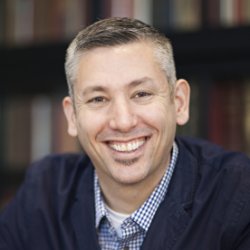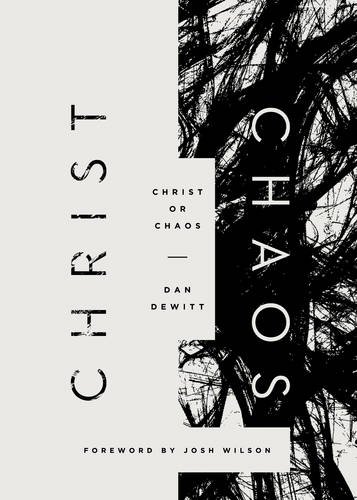Is Christianity irrational? Or is everything irrational if we try to understand it apart from God? Does nature contain for us the answers regarding origins? Or must we look outside of nature for our answers? These are basic questions which we would be wise to consider well.
Greetings, I’m Fred Zaspel, executive editor here at Books At a Glance, and we’re talking today to Dan DeWitt, newly appointed professor of applied theology and apologetics and founding director of the Center for Apologetics and Public Christianity at Cedarville University. He’s also the author of Christ or Chaos and he’s here to talk to us about his new book.
Welcome, Dr. DeWitt, and thanks for talking to us today!
Dan DeWitt:
Thanks Fred, it’s good to be with you.
Zaspel:
Explain for us the significance of the title you’ve given the book: Christ or Chaos? What’s that all about?
DeWitt:
Well, to be completely fair to the person who influenced that, it’s a reference to Dorothy Sayers who gave a speech shortly after Hitler invaded Poland. She told people in Britain that they would either have creed or chaos. That what Hitler was doing was consistent with his worldview. It wasn’t that he was ignoring a Christian objective morality but rather he subscribed to an entirely different morality. Dorothy Sayers’ point was that once you step out of Christianity, that really you’re left with a free-for-all that might makes right. So that title and that thesis is really what compels the book. That you either have, at the end of the day, the truth of Christianity that God exists and has revealed himself or we are left with the world where the weak suffer in the strong flourish and there’s no real objective way to say who’s right and who’s wrong in all of it.
Zaspel:
What contribution are you hoping to make with this book? How is it distinct among other books on apologetics?
DeWitt:
Well I hope… there are so many apologetic books that influenced me and certainly my thesis and the thesis of my earlier book, Jesus or Nothing, is also heavily influenced by Francis Schaeffer. So if someone really wanted to study apologetics I probably would, depending upon where they are at, point them to someone like Francis Schaeffer. Because there is a wealth of resources out there in this area. What I hope my book is unique in contributing is that I hope it offers a story, a narrative where people can see themselves in these conversations and see that Christianity is not intimidated or overshadowed by rival truth claims. So that the gospel can boldly be taken into the public space, into the marketplace of ideas, that Christians don’t have to be intimidated by it. I wanted to do it in a way where I’m not just saying that, but I tried to somewhat model it. This is what a real life conversation can look like that touches on these different themes.
Zaspel:
Who is Thomas? And maybe you’d like to give us a broad overview of the book.
DeWitt:
Yes, in my first book, Jesus or Nothing, I introduce a character by the name of Zach who has grown up in a very conservative, even fundamentalist kind of Christian family, a fundamentalist church, a Christian school connected to the church, and he gets to community college and for the first time he kind of feels free. He has a Christian professor who introduces the topic of evolution and he’s always thought that that was an entirely forbidden topic and now here’s a Christian who is presenting the merits of this model. So he was liberated a community college and I outlined his journey toward atheism.
What I wanted to do in Christ or Chaos is have some similar topics but from a bit of a different perspective. Some of it is patterns from my own life and my own relationships. I have some very close friends who became atheists after moving out of their homes. So I wanted it to be Zach, this character I introduced in Jesus or Nothing, what would it look like for him, who becomes an atheist in college, for his best friend from childhood if they are roommates. And what does it look like when Zach is rooming with this young man named Thomas begins looking at his Christianity afresh kind of responding to his roommate’s challenge that Christianity is irrational. So Thomas is really coming back to his Christian faith not to necessarily reject it but to ask the question, “am I crazy? Do I just believe this because my parents taught it to me?” So the book is him looking at the Christian worldview afresh and see that at every turn of the page that Christianity accounts for the human experience in a way that Zach’s atheism never can.
Zaspel:
Let’s talk just briefly about one question you raise in your book with regard to evolution and religion. What is the problem that evolution faces when it contends that religion is just the result of evolutionary development?
DeWitt:
I think that’s a great illustration of arguments other people have made more in a broad sense but I wanted to apply their argument like Alvin Plantinga, a Christian philosopher who has argued that evolution actually disproves naturalism. But I wanted to apply it very specifically to something we hear all the time. People like Michael Shermer and the founding editor of Skeptic magazine or Daniel Dennett or Richard Dawkins or whoever it might be, will say things like “religion is something that evolution has led us to accept. It helps us cope but we need to grow beyond that.”
And if we stop for a second and look at that challenge that wouldn’t be that big of an issue if most people weren’t religious. If evolution had led a very small percentage of the population to be religious and we could say part of evolution is you have kind of a minority who ends up with this irrational beautiful world. If religion is false. But that’s not the case. The case is actually that the vast majority of people breathing air on this planet who have ever lived, who live right now and from all indicators from a secular standpoint looks like this will always be the case. From a Christian standpoint we know that it will indeed always be the case. Most people have always been, are, and always will be religious. So that means that evolution, if the atheist is right, that evolution is to blame. So the vast majority of people breathing air right now have a delusional view of reality and the single thing they can blame is evolution.
If that’s true that means that evolution cannot be trusted to guide us to a reliable view of reality. And if that’s the case then that means on an atheistic understanding of evolution, there’s no way we could ever get a truth. And if that’s the case, to sort of wrap this up, the atheist who is arguing that evolution led us to religion, that that proves that religion is false, is in no position to make any truth claims because they are part of a system that’s not directed at truth at all.
Zaspel:
Who’s your target audience?
DeWitt:
Well, we would love for a real life Thomas to read it. A college student who is perhaps grappling with these issues, but I had some youth groups who have used it with juniors and seniors. And then I think any young adult, or adult of any age. I would hope that the arguments are accessible enough to introduce them to certain arguments for Christianity and if they want more they can find it elsewhere, but I think my book kind of serves as an appetizer to some perennial arguments for the Christian worldview.
Zaspel:
The book is still very new, but have you been encouraged so far with its reception?
DeWitt:
Yes, I’ve been very encouraged. I actually have a video study and I have a number of churches that are using it to go along with the book. The video study is at the website, ChristorChaos.org.
Zaspel:
We’re talking to Dan DeWitt, author of Christ or Chaos? It’s a really enjoyable read treating massively important questions. We encourage you to check it out. Dan, thanks for talking to us today!
DeWitt:
Thanks so much, Fred.

